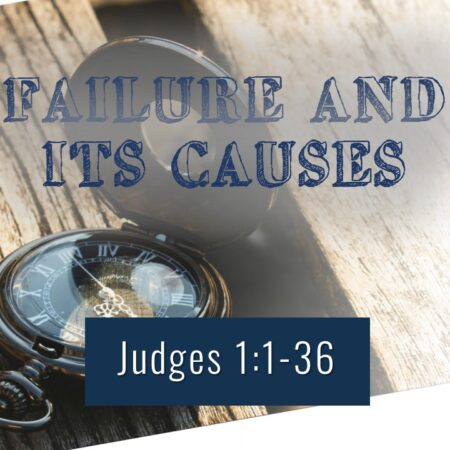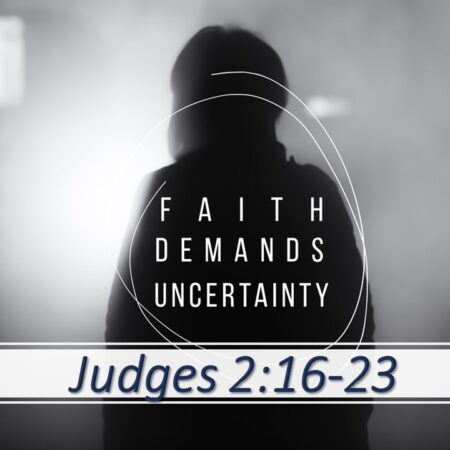Judges 3:12-31 Judges 2:11-15 As Charles Spurgeon once said: “Give whatever tools you have to the Lord, stand your ground courageously, and trust God to use what’s in your hand…
Sermons on Judges (Page 2)
Judges 3:7-11 1 John 2:15-17 Hebrews 3:12-13 Hebrews 4:8-16 2 Corinthians 10:4-6 Numbers 13:2 Numbers 12:1-9 Joshua 15:14-17 Zechariah 4:6
Judges 2:11-3:11 Judges 2:11-13 1 Peter 2:1-9 Judges 2:14-23 Judges 3:1-6 Hebrews 11:1 1 Corinthians 10:1-22 2 Corinthians 11:16-28
Judges 1:1-36 Judges 17:6 Judges 2:1-5 Chuck Swindoll in his Study Bible says it this way: “The time of the judges was a spiritual and national train wreck for Israel.…
Dr. Michael Heiser in his book: “The Unseen Realm” makes this statement:
“The seeds of that failure were sown in the events of the conquest. For whatever reasons – lack of faith or lack of effort, or both – Israel failed to drive out their enemies. They allowed vestiges of the targeted bloodlines to remain in the land in the Philistine cities. They chose to coexist (Judges 1:27-36). The visible Yahweh, the Angel, asks the rhetorical question, “Why would you do such a thing?” and he announces the consequences: “Now I say, I will not drive them out from before you; they will become as thorns for you, and their gods will be a trap for you” (Judges 2:2-3). The name of the place where he uttered these words was thereafter appropriately remembered as Bochim, a Hebrew word that means “weeping”.
John North wrote the foreword to Malcolm Muggeridge’s book titled: “The End of Christendom”
The book is based on Malcolm Muggeridge’s lecture series given in 1978 at the University of Waterloo, Ontario.
“Most of the great universities of the West were founded with the conviction that theology is the queen of the disciplines, and that the key to man’s wholeness is the pursuit of the truth of God through Jesus Christ. Apart from that truth, it was believed, all other expressions of truth are fragmentary and sterile. Now, in the latter part of the twentieth century, that tradition has almost disappeared. Where Jesus Christ and Christian doctrine are the subject of formal study, it is usually as a minor are of Comparative Religion or in a divinity school well segregated from the general student body. Religious enthusiasm among students is an embarrassment; belief in the authority of the Bible and the deity of Jesus Christ is treated as naivety to be enlightened rather than life to be nourished. Scholars in the arts, letters, and sciences who show signs of Christian devotion are likely to be shrugged off as simplistic and eccentric. Coincidentally, truth itself has become devalued, especially in the humanities and social sciences and increasingly in the pure sciences, its consequence and even existence of matter of doubt.
Universities seem to promote fragmentation, in part by undermining general studies in favor of specialized and practical studies, in part by ignoring the signs of decay in the spiritual, moral, and emotional health of the academic community.”
Chuck Swindoll in his commentary ON ACTS:
“The Lord used the old covenant to prove that HEARING the word of God isn’t our primary problem. HEEDING the word of God is our constant challenge. With the inauguration of the new covenant, our Master has taken a different approach. Instead of standing before us to issue orders, He now lives within us to transform our minds (Romans 12:1-2) so that we begin to think His thoughts. As the Spirit gradually takes over, defeating our old, selfish, vain, foolish manner of life, we begin to cherish what God cherishes, make decisions according to His values, and view life from His eternal perspective.” Chuck Swindoll
In his essay on prayer, C.S. Lewis suggested that God treats new Christians with a special kind of tenderness, much as a parent does with a newborn. He quotes an experienced Christian: “I have seen many striking answers to prayer and more than one that I thought miraculous. But they usually come at the beginning before conversion, or soon after it. As the Christian life proceeds, they tend to be rarer. The refusals, too, are not only more frequent; they become more unmistakable, more emphatic.”
C.S. Lewis asks: “Does God then forsake just those who serve Him best? Well, He who served Him best of all said, near His tortured death, “Why hast thou forsaken me?” When God becomes man, that Man, of all others, is least comforted by God, at His greatest need. There is a mystery there which, even if I had the power, I might not have the courage to explore. Meanwhile, little people like you and me, if our prayers are sometimes granted, beyond all hope and probability, had better not draw hasty conclusions to our own advantage. If we were stronger, we might be less tenderly treated. If we were braver, we might be sent, with far less help, to defend far more desperate posts in the great battle.”
The philosopher Soren Kierkegaard, in his book “Philosophical Fragments”
“Christians remind me of schoolboys who want to look up the answers to their math problems in the back of the book rather than work them through.”
“Faith like Job’s cannot be shaken because it is the result of having been shaken.” Rabbi Abraham Heschel






